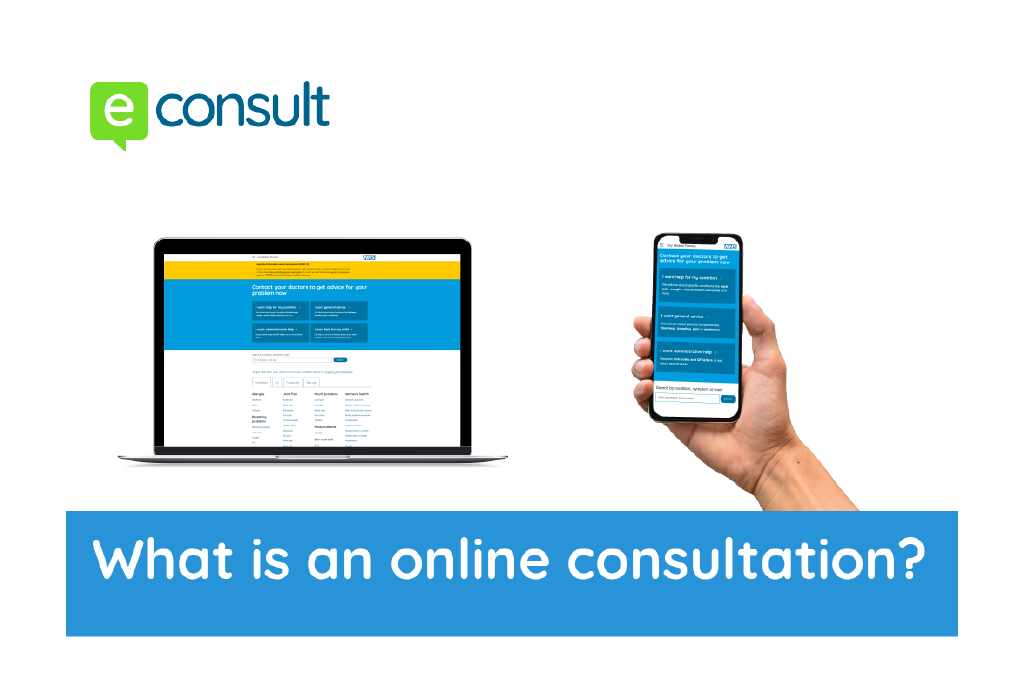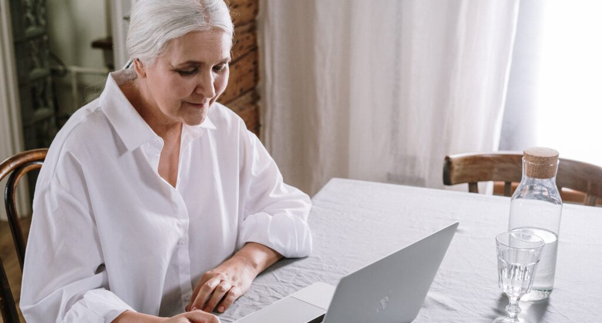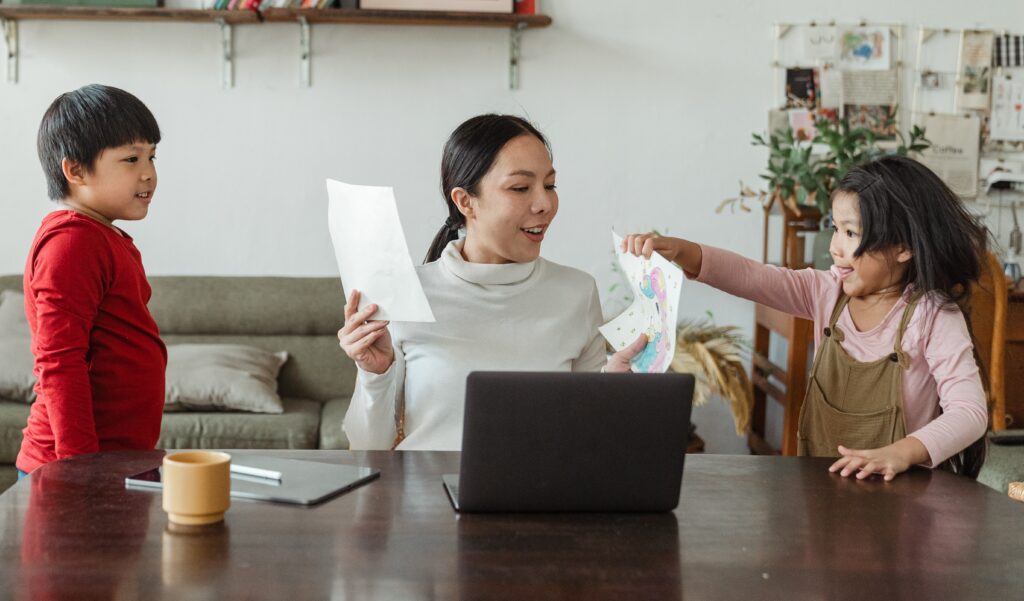What is an eConsult or an online consultation?

Online consultations have become more common during COVID-19, with the NHS and GP practices trying to balance protecting patients and staff while continuing to provide the support and care required.
But what exactly is an eConsult or an online consultation? NHS England describes online consultations as “where you fill in an online form or speak to someone online about a health issue”. There are many benefits to you and your practice in using online consultations, and we’ll explain these as we go. As with everything there are a few different types of online consultation. Some are mainly free text boxes, whilst others might have more structure and ask more specific questions.
Let your practice know why you need help at a time that suits you

When you call your practice asking for an appointment, the first challenge is often waiting to speak to a person. Once you manage to get through the telephone queue, the receptionist will often ask what symptoms you have or why you feel you need the appointment.
An online consultation does the same thing, however, it collects more information from you than you would normally be able to provide to a receptionist. The main difference is that you are filling in this information online, instead of talking to someone over the telephone. We know some people find this less scary or embarrassing than talking to someone on the phone or in person.
In filling out this information online, you are able to do this at any time of the day or night. You don’t have to wait for the practice to open so that you can speak to a receptionist, and you don’t have to try to call when the practice opens, only to find there are no appointments left today. You also don’t have to wait for weeks to book your own appointment. Online consultations mean that you can tell your practice why you need help at a time that suits you, without the phone queue.
Online consultations are different from remote consultations
Along with ‘online consultations’ you might also see the words ‘remote consultations’ being used. A remote consultation is sometimes what happens after the GP practice has reviewed the information you provided in your online consultation. Unlike a face-to-face appointment which would be a ‘normal’ consultation, a remote consultation is done without you and your doctor having to be in the same location (your GP surgery). Instead, it is a consultation carried out remotely, via phone or through a video call.
What happens after an online consultation?
After a patient submits an online consultation, their GP practice can review the request and decide on the most appropriate care. This might be:
- an email reply with information on how you can manage your own symptoms,
- a prescription, available to collect from your nominated pharmacy,
- a sick note,
- a follow-up phone call, or video-call, to ask further questions,
- or a face-to-face appointment with a healthcare professional.
Online consultations allow you to input information so your doctors can get you the right care as quickly as possible.
Online consultations give practices more information about the needs of all of its patients

The information you provide online allows your practice to decide which healthcare professional is best placed to suit your needs (the doctor, nurse or someone else at the practice), and how quickly you need their help. In some ways submitting an online consultation is similar to either phoning your practice or walking-in to speak to a receptionist.
This is called triage, and triaging patients is very important when you have lots of patients asking for your help, as is the case across all of the NHS. Triage also happens in other healthcare settings, such as in A&E where you are seen based on the urgency of your illness or injury. The same needs to happen at your doctor’s – they need to understand who needs help urgently, and who can wait a little longer.
The great thing about online consultations is that they provide your GP surgery with very detailed information about what symptoms you have and the effect they are having on you. They can then decide, based on the doctors and nurses available to support you, your symptoms, and the needs of other patients, how best to help all of you.
Online consultations are not a short-cut to an appointment, and often an appointment is not the right outcome for every patient request. The reason for this centres around triage – the practice needs to be able to know what all their patients are asking for so that they can give appointments to those most in need. They also need to decide on the right format and time frame for that appointment, as well as the right healthcare professional to help everyone.
You can get help quickly without having to travel to the GP practice

The NHS England definition of online consultations also states that “once you have answered the questions in the online form, you will get an email or text confirming your online consultation is complete and giving you advice about what to do next. If your GP surgery needs to get in touch with you, they may suggest a phone or video consultation.”
At this point, you’ve provided your practice with information about your needs through your online consultation. They can now make a decision, based on this and what they already know about you, about what to do next. They also need to tell you what this is!
You might get an email or text from the practice thanking you for sending through your online consultation and giving you those next steps. This might include links to NHS guidance about how to look after yourself or your child, or they might let you know that a fit note or prescription is available to collect. Some practices might send you your fit note over email, meaning you don’t have to visit the practice to collect it or they will send your prescription straight to your nominated pharmacy. These forms of online communication save you a trip to the practice and still give you the help you need to get better.
If the doctor or nurse decides they really need to see you in person, they will suggest you come in for a face-to-face appointment. In our experience, around 4 in 5 patients can be helped without them going into the practice for an in-person consultation. Limiting face-to-face appointments to those who really need them is very important, especially during COVID-19, as people might not show any signs of being ill.
Your doctors or nurse can dedicate more time to helping you
If your doctor or nurse decides that they do need to have a follow-up consultation with you, this could be over email, video or face-to-face. Either way, they will have all the information you provided in front of them.
They will have had time to look at your medical record and look into possible reasons for your symptoms and do some research if needed. They might also decide they don’t have all the information they need, so they may ask you to go for some tests before they have a good idea about what your symptoms mean. All of this is happening without you being in the same room – which means the GP or nurse is protecting your time, whilst providing you with the same care they would normally. In fact, some might argue that they are able to provide better care because they have more time and more information. This means you might get more of your GP’s time than you would in a normal 10-minute, face-to-face consultation. When you do speak to your GP, remotely or in person, this consultation should be more focussed on the next steps, such as treatment plans, as they already know why you need their help.
eConsult is an online consultation provider
eConsult is the most widely used online consultation provider across the NHS. We were started and are still run by NHS doctors who wanted to use technology to better help their patients. Our online consultation platform is available from your practice’s website or the NHS App in England, for ease of use. It allows you to select the type of help that you need or that you need for your child.
The online questionnaires follow a structure, as our experience has shown that this collects the most important information needed by doctors and nurses to provide you with the best care. We ask patients a few questions about their needs and we understand this can take a bit of time to complete, but we ask for this information in order to be clinically safe and ensure we can get the most appropriate help for each individual patient. We make this available online at any time of the day or night, from any device, for your convenience. Over 80% said they are satisfied with eConsult. Read one of our patient case studies for a first hand account.
Every patient is different, with different routines and needs, so we have built something that works for the majority of patients. Feedback from GP practices also tells us that it works for GPs, nurses and other practice staff, helping to support their workloads. Everything we do is built with patient safety in mind and based on our clinical expertise so that both patients and practice staff feel confident submitting and reviewing eConsults.
We understand that the way GP practices work is changing and all the new language and ways to access your health can be confusing. We want to help make it clearer for you, and to show you that eConsult is not replacing face to face appointments. eConsult is just another method of putting in your request so that your GP practice can make sure you and other patients at your practice get the right care.
You can see if your practice uses eConsult by visiting https://patients.econsult.health/ and searching for your practice by name.